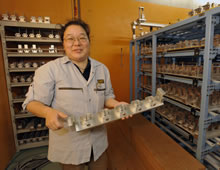
Tomoko ABE
1989: Graduated from the Graduate School of Agricultural Science, Faculty of Agriculture, Tohoku University. Awarded Ph.D. in Agriculture
1988: Japan Society for the Promotion of Science (JSPS) Special Researcher at the Institute of Genetic Ecology, Tohoku University 1990: Start working for RIKEN. First worked in the Drug Action Research Laboratory, becoming a full-time researcher in the Plant Productivity Systems Research Group in 1998, a full-time researcher in the Accelerator–based Research Development Group in 2005, sub-team leader, in 2006, and now team leader of the Radiation Biology Team.
■ Message for future scientists
‘Be interested in many things and try to find the answers yourself’. The development of the Internet makes it easy to access information sent out by somebody else, and as a result, I think, directly lessens the opportunities to experience something first hand. If you have a question or encounter some strange phenomenon, ask why, and construct your own theory to explain it, then use your hands and mind to prove your theory. When you realize that unexpected discoveries can come from repeating such acts, I think you’ll come to like science.
Let me tell you my own experience. This was back when I was still at the university. Asparagus has male (XY) and female (XX) plants, and the male plants produce about 30% more spears, so we were looking for a way to identify the sex of a plant at a young stage. Asparagus doesn’t show any sex difference until it flowers, which usually takes two to three years. I was looking for a protein that might show the sex of the plant at an earlier stage, but I knew it would not be very useful for farmers even if I could find the protein because the process required special analytical equipment. So I searched for a simpler way to identify the sex, trying a series of germination tests with solutions using various compounds. I hoped to find an agent which would eliminate female plants at that stage.
I failed to find such an agent and the experiment as such was not successful, but I noticed a little later that there was a young asparagus plant as thin and small as a matchstick with a flower bud. It seemed impossible that an asparagus plant would flower at such a young stage, so I repeated the seed treatment with the agent only to find that the plant flowered again at a very young stage. The whole lab got excited because we seemed to have found the magic flowering agent, but the process didn’t work for plants other than asparagus. And since the agent used was actually a herbicide, the treated individual plants eventually died. However, we continued this line of research with Kyoto University, with whom we were studying plant hormones, and eventually succeeded in creating a compound that suppresses the herbicidal effects but encourages flowering activity. I think this is a good example of an unexpected discovery that led to further research.
Let’s change the angle. There are people who say, ‘I like biology but not mathematics,’ and there are others who say, ‘I like mathematics but not living things’. I was of the first type when I was a student. I used to think, ‘I don’t like math because I can’t read formulae’, and never imagined myself working on an accelerator with nuclear physicians who don’t like living things. But this totally unexpected turn of events led me to results. What I want to say here is this: don’t be stubborn about anything, or make excuses like, ‘it’s not my area of research’, or ‘I don’t understand’. By opening yourself to many ideas and extending your interests, something new may be born, or something new may be achieved, perhaps not by you alone but together with fellow researchers. RIKEN has many experts who are authorities in their fields and most of them are very kind and generous in sharing their knowledge, if you go and ask. In this regard RIKEN is an ideal place for research.